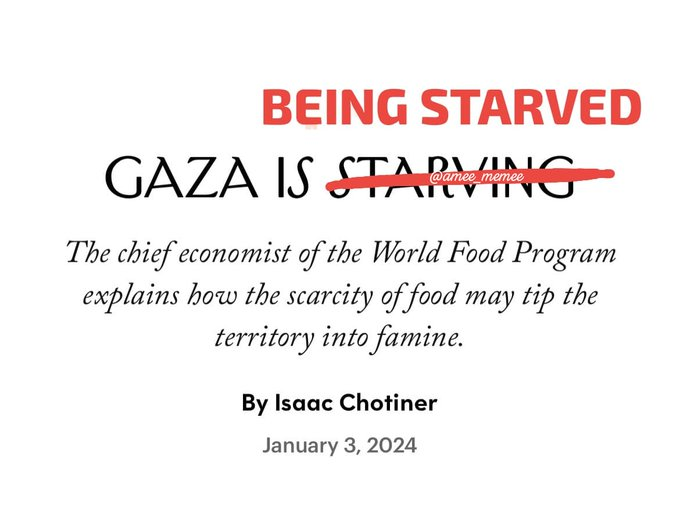
New Yorker staff writer Isaac Chotiner earned bonus hasbara points on 3 January 2024 by getting an article published, “Gaza is starving“, that cleverly avoids any mention of the perpetrator—Israel in 2,000 words. A month before this article, on 7 December 2023, a Human Rights Watch press release had asserted that “The Israeli government is using starvation of civilians as a method of warfare in the Gaza Strip, which is a war crime.”
Chotiner interviews Arif Husain, chief economist at the United Nations World Food Program. Arif Husain himself is on UN brand, sticking to describing the horrific situation and focusing on what is needed to remedy it.
That dancing paper clip grammar advisor, introduced for a while in the late 1990s by Microsoft to its Word text processing software, would have been doing the jitterbug on Chotiner’s computer with the amount of cleverly-phrased, passive tense he deployed to avoid mentioning Israel—the obvious and deliberate agent of Gaza’s approaching famine.
I have written to Arif Husain, asking him if he really didn’t mention “Israel” once in the presumably recorded interview that ended up in this article. I’ll post any response.
That it’s an interview, quoting Arif Husain’s own words, doesn’t get Chotiner off the hook. Here is the article’s title and subheading, the introduction Chotiner wrote, and the questions Chotiner asked—all of which Chotiner has control over. These are posted without further comment. That Israel should have been mentioned, at least in the article introduction, really doesn’t need to be said.
The article’s title
Gaza is starving
The article’s subheading
The chief economist of the World Food Program explains how the scarcity of food may tip the territory into famine.
The article’s introduction
Last month, a United Nations report on hunger described a catastrophic situation in Gaza, where more than ninety per cent of the population has been facing “acute food insecurity,” and where “virtually all households are skipping meals every day.” Much of Gaza is at risk of famine in the next several months. Parents have been going without food to insure that their kids have at least something to eat; where food is available, moreover, prices have skyrocketed, making it inaccessible even for middle-class families. The report noted, “This is the highest share of people facing high levels of acute food insecurity” ever recorded “for any given area or country.” I recently spoke by phone with Arif Husain, the chief economist at the United Nations World Food Program, which was one of the partner organizations that compiled the report. The W.F.P. also collects data on hunger around the world and delivers food to needy people. During our conversation, which has been edited for length and clarity, we discussed what the people of Gaza are currently facing, the reasons many cannot access food, and why this crisis is so unprecedented.
The part above in bold, “the reasons many cannot access food”, is never once asked nor touched on in Chotiner’s article. This part of the introduction is completely dishonest.
The interviewer’s questions
- Could you describe the food-access situation in Gaza right now?
- Can you describe the difference between crisis, emergency, and famine?
- How does Gaza seem similar to other conflict zones, and how does it seem different?
- There have been reports that in some places in Gaza food has become really expensive. Can you talk about what we’re seeing in Gaza specifically?
- Let’s return to the question of how you put this report together with a bunch of different organizations. It’s incredibly hard for the media, for human-rights workers, to be on the ground in Gaza. Can you talk about how a report like this is created given those conditions?
- You mentioned how there are different standards for measuring hunger or starvation for kids and adults. Can you talk about why that’s the case, and can you also talk about the specific things facing children who lack access to food?
Chotiner’s other greatest hits from Billboard magazine’s ‘Unspoken Word’ Chart (except when it’s Israeli atrocity propaganda)




Related articles on this site
Scottish OG from the time of the First Palestinian Intifada and the birth of the international movement of solidarity with the Palestinian people • Author of one of the first blogs/first warblog— A Personal Diary of the Israeli-Palestinian Conflict (1994-1998) • Former Friends of Birzeit University (FoBZU) Coordinator • Former Birzeit University Public Relations Officer and Webmaster • Co-creator of the first independent media website in 1996— On the Ground In Ramallah: Reports from a town become battlefield • Cofounder and Editor of the original Electronic Intifada website • Day producer for Global Revolution’s news channel during #OccupyWallStreet, which introduced the world to the crowd-sourced power of livestreaming • Creator of countless websites for pro-Palestinian and nonprofit organizations around the world via nigelparry.net


